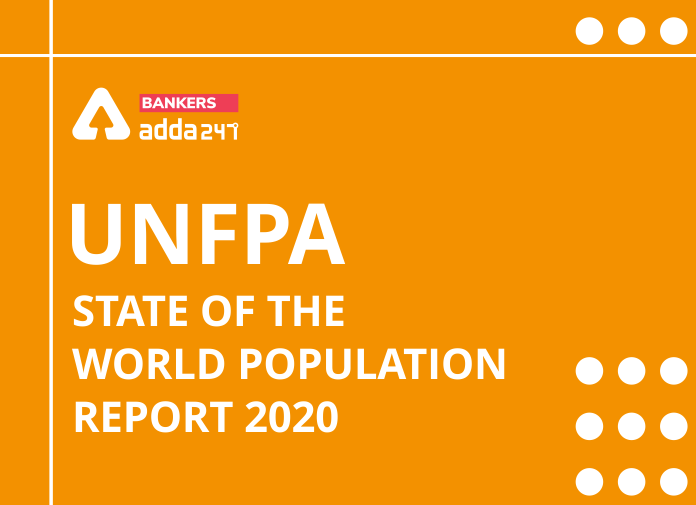Table of Contents
State of the World Population Report 2020:
The United Nations Population Fund (UNFPA) has released the State of the World Population 2020 report. The titled of the report ‘Against my will: defying the practices that harm women and girls and undermine equality’.
The report highlights at least 19 human rights violations against women and focuses on the three most prevalent ones, Female Genital Mutilation (FGM), extreme bias against daughters, in favour of sons and child marriage.
Also Check
- Global Startup Ecosystems Ranking 2020 released
- THE Young University Ranking 2020 released
- China-Japan: Senkaku Islands Dispute
Global Data of the report:
- Missing females/women: These are women missing from the population at given dates due to the cumulative effect of postnatal and prenatal sex selection in the past. The phrase was coined by Amartya Sen.
- The number of missing women has more than doubled over the past 50 years, who were at 61 million in 1970.
- In Afghanistan, Bangladesh and Pakistan excess female mortality of girls below 5 years of age was under 3%.
- Excess female mortality: It is the difference between observed and expected mortality of the girl child or avoidable death of girls during childhood.
- According to estimates averaged over a five year period (2013-17), annually, there were 1.2 million missing female births, at a global level.
Also Check
- Uttarakhand releases report on conservation of endemic, threatened floras
- International Day for the Fight against Illegal, Unreported and Unregulated Fishing: 5 June
India Specific Data of the report:
- India has the highest rate of excess female deaths at 13.5 per 1,000 female births or one in nine deaths of females below the age of 5 due to postnatal sex selection.
- One in three girls missing globally due to sex selection, both pre- and post-natal, is from India, i.e. 46 million out of the total 142 million.
- India (40%) along with China (50%) account for around 90% of the estimated 1.2 million girls lost annually to female foeticide.
- In India, around 460,000 girls went missing at birth, which means they were not born due to sex-selection biases, each year between 2013 and 2017.
- The report took note of the successful cash-transfer initiative such as ‘Apni Beti Apna Dhan’ in India.
Also Check
- MOHUA announced results of Star rating of garbage-free cities
- HIV Vaccine Awareness Day
- 45th India Ideas Summit 2020
About Female Genital Mutilation:
- It involves the partial or total removal of external female genitalia or other injuries to the female genital organs for non-medical reasons.
- The practise has no health benefits for girls and women and can cause severe bleeding, problems in urinating, cysts, infections, as well as complications in childbirth and increased risk of newborn deaths.
- An estimated 4.1 million girls will be subjected to female genital mutilation in 2020.
About Child Marriage:
- Every day, around 33,000 girls under age 18 are forced into marriage, usually to much older men.
- In India, child marriage is directly linked to poverty, poor education and geographic location and the rural and urban divide.
Also Check
- World Thalassaemia Day 2020: Need to Know Types, Symptoms, History
- European Union announces 750 billion- euro COVID-19 recovery fund
- IMD World Competitiveness Index 2020
About United Nations Population Fund (UNFPA):
- It is a subsidiary organ of the UN General Assembly and works as a sexual and reproductive health agency.
- It was established as a trust fund in 1967 and began operations in 1969.
- In 1987, it was officially renamed the United Nations Population Fund but the original abbreviation, ‘UNFPA’ for the United Nations Fund for Population Activities was retained.
- The UN Economic and Social Council (ECOSOC) establishes its mandate.
- UNFPA is not supported by the UN budget, instead, it is entirely supported by voluntary contributions of donor governments, intergovernmental organizations, the private sector, foundations and individuals.
- UNFPA works directly to tackle Sustainable Development Goals on health (SDG3), education (SDG4) and gender equality (SDG5).
Also Check
Click Here to Register for Bank Exams 2020 Preparation Material
Visit Achieversadda.com and participate in discussions with other aspirants and achievers. Get answers to your queries and connect with others on Achieversadda.com



 Adda247 Launched the Coaching with Degre...
Adda247 Launched the Coaching with Degre...
 Financial Regulators In India
Financial Regulators In India
 What is the Monthly Salary of Bank PO?
What is the Monthly Salary of Bank PO?




